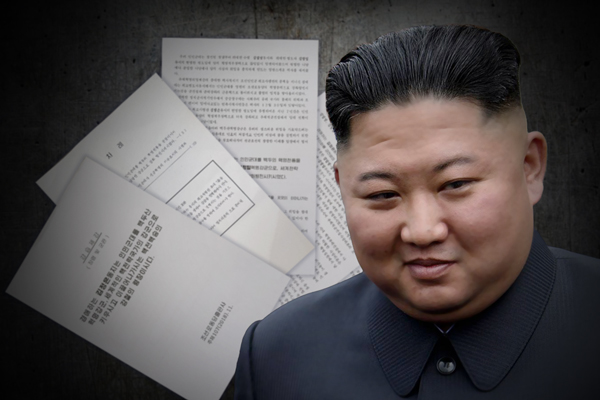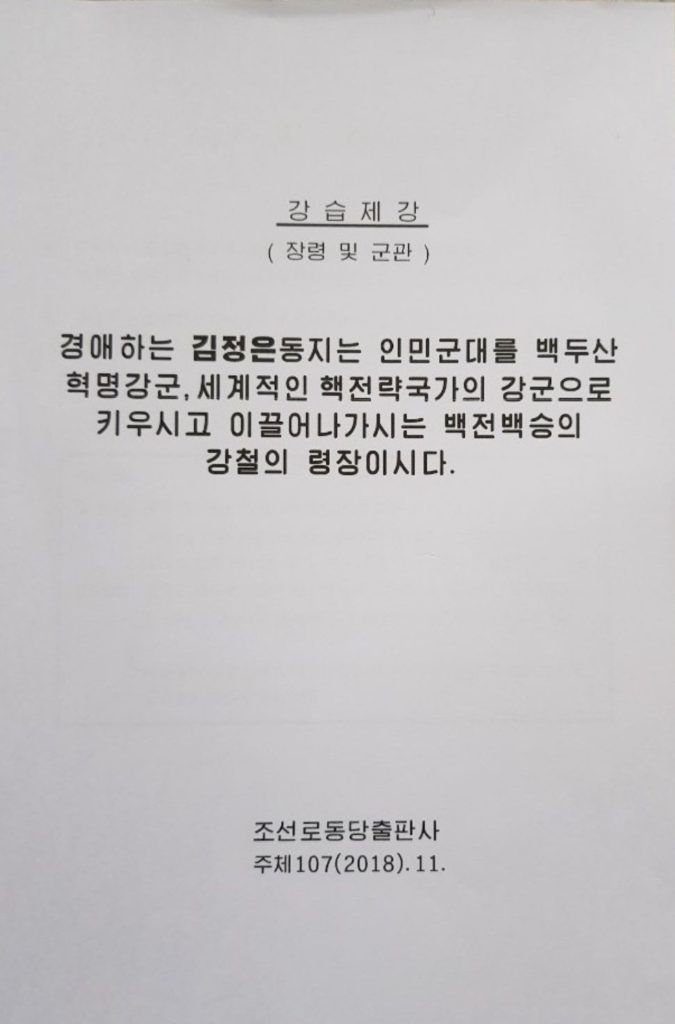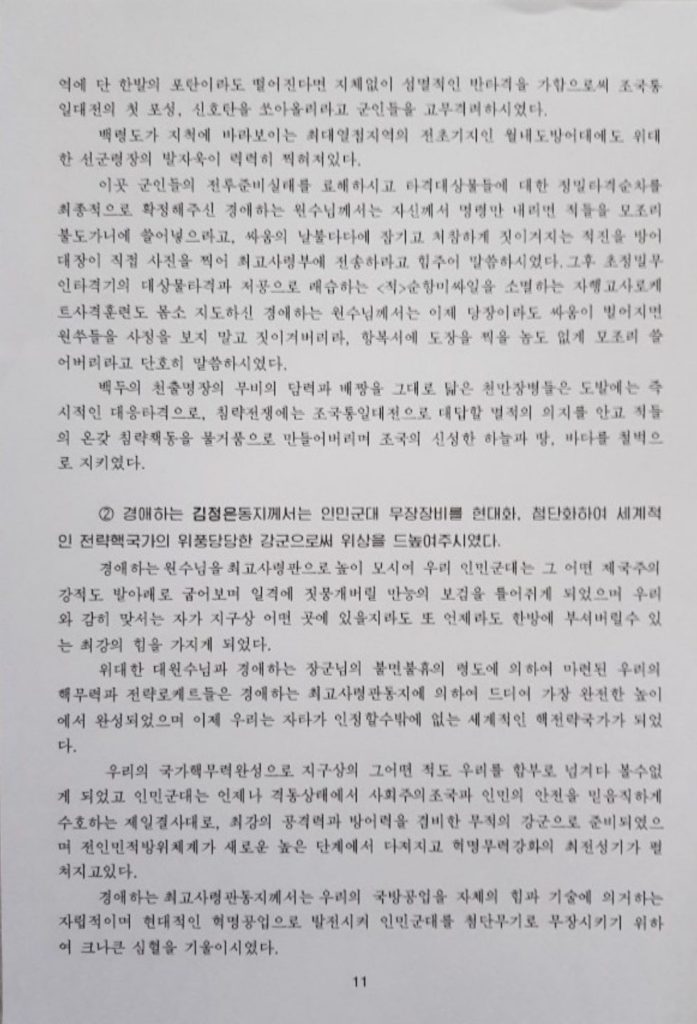An official North Korean document viewed by the One Korea Network suggests North Korean leader Kim Jong-un had no intent to give up his nuclear weapons while he was preparing for his second summit with U.S. President Donald Trump.
The document is a teaching guide for instructing top military officials on Pyongyang’s official internal position. Published by the Korea Workers’ Party Publishing Company in November 2018, the document was prepared as material for December 2018 training lectures to North Korea’s top military officials, just two months ahead of the second summit with President Trump in Hanoi, Vietnam.
“Our Dear Commander-in-Chief, amid the busy preparation for the final nuclear talks with the United States, recently called in key commanders of the People’s Army, and now the Americans are so scared of our nuclear power that they are trying to take it away from us and have been trying to negotiate,” the document read. “He [Kim Jong-un] will not miss this opportunity and have a final talk with the President of the United States on the nuclear weapons.”
The document makes clear that Kim saw the upcoming meeting in Hanoi was aimed at striking “a final deal” as a means to obtaining acceptance as a “global nuclear strategic state.” The term “denuclearization” is not mentioned once in this document, even though officials from the United States and South Korea continued to spread the message that North Korea promised to denuclearize.
The North Korean document continues as follows:
“Whatever the outcome of the nuclear talks with the U.S. will be, it will be decided by the strategic choice of the Workers’ Party and it will further consolidate the nuclear power we’ve created by overcoming all the meetings and will keep in mind that this is the first step towards achieving the result of elevating (North Korea) to the status of a world-class nuclear power state. The People’s Army is holding on to its nuclear power, our omnipotent sword, which our Leaders have prepared for us, and protecting our leaders of the revolution, raising their status as a powerful force as the world’s strategic nuclear state. And as (Kim Jong-un) spoke passionately, he showed his masculinity.”
The Voice of America earlier reported on some parts of the document in June 2019, and this attracted media attention in both the United States and South Korea. At that time, a State Department spokesperson told VOA that “President Trump remains committed to the goals the two leaders set out at the Singapore summit of transformed U.S.-North Korea relations, building lasting peace, and complete denuclearization.” The spokesperson continued, “As President Trump has said, he believes Chairman Kim will fulfill his commitment to denuclearize.”
Morgan Ortagus, then-State Department spokesperson, reiterated that position when asked about the document at a press briefing held a day after the news broke. “We certainly don’t comment and speculate on every report,” she said. “But since you asked me, President Trump and the Secretary believe that Chairman Kim will fulfill his commitment to denuclearize, and that remains our policy.”
In South Korea, there were slightly different reactions to the report at that time. South Korea’s Unification Ministry said it was aware of the report but that its authenticity needed to be verified. Kim Yeon-chul, South Korean Unification Minister in 2019, said that “the government is reviewing how much we can trust the purpose of the document, but this process is not easy.”
Cheong Seong-chang, a North Korea expert at the Sejong Institute in Seoul, argued that the document was missing key elements and that the format of the date is also “non-standard.” He said some similar lecture documents he obtained had “internal only” printed on the first page, but that the document reported by the VOA was missing this wording.
He also argued that the People’s Army Publishing Company is the one that typically publishes such lecture documents, instead of the Korean Workers’ Party Publishing Company. “Considering how North Korea behaved in the denuclearization negotiation ahead of the Hanoi summit, the contents of the document could be true,” he said. “However, there were many fake lecture documents reported by the media, so the authenticity needs to be verified carefully.”
Lee Hyun-seung, regional director of the One Korea Network, who closely examined the document prior to the VOA’s first report in 2019, said that debating its authenticity is meaningless, if not ridiculous. “Internal documents used during lectures are collected by senior party officials or are incinerated afterward,” he said. In this case, it is certain that “(o)ne of the people who participated in the lecture at that time copied photos of the document and took them with him outside.”
Lee defected from North Korea in 2014 and now lives in the United States. He had previously worked in a trading business owned by the North Korean government and lived for a time in Dalian, China. His father is Ri Jong-ho, who worked for North Korea’s Office 39, the Workers’ Party operation known for raising money for Kim through illicit activities. Ri said he attended training lectures similar to the ones mentioned in the document, and that the fact that the document was published by the Korean Workers’ Party means that it directly reflects Kim Jong-un’s thoughts and the ideology of the party.
“It makes no sense that someone would try to make some 10 page long [fake] document,” Lee Hyun-seung said. “I have seen many other propaganda materials, including North Korea’s internal documents talking about becoming a nuclear state and striking a final deal.”
He said it is sad that people who never participated in such lectures or looked at the lecture documents firsthand are questioning the authenticity of the document. “It is like someone saying that he climbed up to Mt. Baekdu [in the northern part of Korean Peninsula] even though he has only been to the [southern island of] Jeju. I doubt their credibility as a North Korea expert.”
Lee also questioned South Korean intelligence capabilities. “They are saying they need to verify its authenticity. If the Ministry of Unification cannot even verify this single document’s authenticity, it means that their North Korean policy has completely failed,” Lee added. “Or they just cannot tell the truth.”
Lee added that it is a waste of time to debate the authenticity of the document. He said North Korea’s behavior speaks for itself. “Realistically speaking, North Korea did not give up a single nuclear weapon,” he said. “Everything is proceeding as was mentioned in the document, and their nuclear policy is ongoing. Still thinking that Kim Jong-un has a will to denuclearize is deluding oneself and the whole world.”
Many conservatives in South Korea argue that the whole denuclearization scheme started with Chung Eui-yong, then National Security Advisor and current Foreign Minister of South Korea, in March 2018. He held a press briefing at the White House explaining his visit to Pyongyang that year.
“I told President Trump that, in our meeting, North Korean leader Kim Jong-un said he is committed to denuclearization,” Chung said in the briefing. There were many times that Kim Jong-un and his father Kim Jong-il said they were willing to denuclearize. However, their term denuclearization refers to the denuclearization of the Korean Peninsula, instead of just the denuclearization of North Korea. Some argue that either Moon and Trump were both played by North Korea, or that Moon tricked Trump to talk with Kim.
There are even some comments in articles related to the North Korean denuclearization issue that say that among Trump, Moon, and Kim, the only person who did not lie throughout the negotiation process was Kim. The argument is that Kim, in fact, has never said he would unilaterally give up his nuclear weapons. As evidence it is pointed out that the 2018 Panmunjom Joint Declaration between Moon and Kim states that “South and North Korea confirmed the common goal of realizing, through complete denuclearization, a nuclear-free Korean Peninsula.” The joint statement from Trump and Kim at the Singapore Summit held in June 2018 read, “Reaffirming the April 27, 2018 Panmunjom Declaration, the DPRK commits to work toward complete denuclearization of the Korean Peninsula.”
Terms such as “realizing” or “work toward” used in the statements are far from “committed to denuclearization,” as Chung first argued.
Denuclearization of the Korean Peninsula and denuclearization of North Korea are totally different, as Lee Hyun-seung and many experts point out. South Korea does not have any nuclear weapons on its territory after the United States withdrew all tactical nuclear weapons deployed in the South in 1991.
Former U.S. negotiators continuously warned that what North Korea wants is the withdrawal of the U.S. Army in South Korea and, ultimately, an end to the alliance between Washington and Seoul so that its “nuclear umbrella” is completely removed.
Meanwhile, the latest surveys conducted in South Korea show that people do not believe that Kim Jong-un is willing to denuclearize.
According to a study by Realmeter conducted on April 30, 2018, a few days after the summit between Moon and Kim, 64.7 percent of respondents said they trusted North Korea’s willingness on denuclearization and peace development. The study said 78.3 percent of people did not trust North Korea’s sincerity before, but that their views changed drastically after the summit.
However, public opinion has changed over the last few years as many South Koreans do not see any progress with denuclearization as the U.S. and South Korean governments promised. According to an RnSearch survey conducted in January 2021, 64.7 percent of people said they think “denuclearization of the Korean Peninsula” is not possible. The figure was highest among people in their 20s at 73.2 percent, followed by those in their 30s (72.4 percent) and 60s (63.5 percent).






